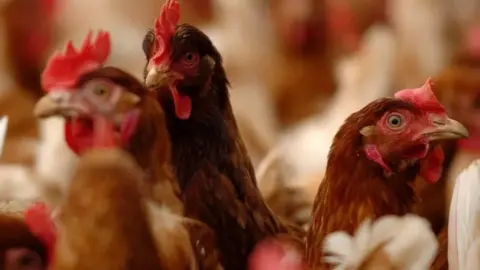Bird flu: Suspected infection found at Castle Espie reserve
 PA Media
PA MediaDisease control measures have been introduced at Castle Espie in County Down after a case of bird flu was found in samples collected from captive birds.
The Department of Agriculture said a 1.9 mile (3km) restriction zone is in place around the reserve.
It means that all poultry and captive birds must be kept indoors or otherwise separate from wild birds.
Further tests are being carried out to confirm the strain.
Flock owners, from commercial to backyard keepers, have been advised to review their biosecurity measures.
Castle Espie said its wetland centre is temporarily closed and that it is "taking measures to prevent the spread of this bird disease".
It apologised to people planning to visit and said anyone who had booked tickets could contact the centre to rearrange or receive a refund.
The worst-ever outbreak of the Highly Pathogenic Avian Influenza H5N1 strain on these islands began in October 2021.
More than 180 cases have been confirmed throughout the UK in the past 12 months, including six in Northern Ireland.
But there have been no detections in commercial flocks since early February 2022.
Six incidences have also been confirmed in the Republic of Ireland.
'Significant' wild bird cases
There has also been what the department has described as a significant number of findings in wild birds during the year.
In the past 12 months, thousands of birds in owned flocks have been culled to try to limit the spread of the disease, which poses a severe threat to the poultry industry.
In England, 28 cases have been confirmed since the start of October 2022.
"The continual positive findings of H5N1 across Great Britain, and findings through our wild bird surveillance programme, suggest that the disease is already once again present in Northern Ireland," said Environment Minister Edwin Poots.
"It is of paramount importance that all bird keepers take appropriate action to review and enhance their biosecurity measures to protect their birds from this highly-infectious disease.
"No poultry premises or captive bird site is immune from a potential incursion.
"All must take immediate action now to protect not only local flocks and commercial premises, but our entire industry and specialised conservation and educational sites, from this dreadful disease."
The Avian Influenza Protection Zone measures in Northern Ireland were lifted in June 2022 after seven months, although owners were advised to maintain strict biosecurity control measures.
While the risk to human health is low, members of the public are advised not to handle sick or dead wild birds that they may find.
Instead, they have been asked to report them to the DAERA helpline on 0300 200 7840 so they may be collected for surveillance if necessary.
Not handling birds may also help prevent the disease spreading to other seabird colonies or into poultry flocks.
